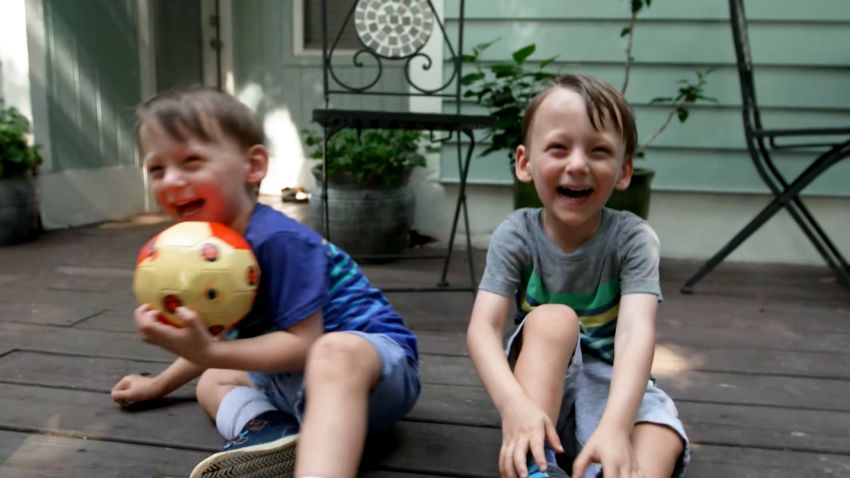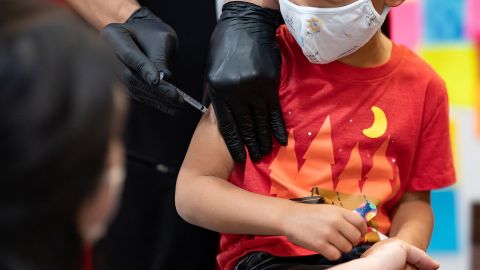
What are possible side effects from the Covid-19 booster for kids? A medical expert weighs in

– Source: CNN ” data-uri=”archive.cms.cnn.com/_components/video-resource/instances/h_e808f6eb0eb5ddfd7a6ce6d6e314506f-h_e4846d0e7702be4dc87ea68bfa0f7f1e@published” data-video-id=”health/2022/06/20/covid-vaccine-children-under-5-gupta-newday-vpx.cnn” data-vr-video=””>


Vaccines for children under 5 a turning point for many US families
04:14 – Source: CNN
CNN —
Last week, the US Food and Drug Administration authorized the bivalent Covid-19 booster for children 6 months to 5 years old. The US Centers for Disease Control and Prevention has since recommended the booster, and now everyone 6 months and older is able to receive the updated coronavirus vaccine except kids who got three doses produced by Pfizer/BioNTech.
Which young children are now eligible to receive the booster? What if kids haven’t started or completed the full series — do they now get the updated booster or the original monovalent vaccine? Can parents and guardians choose between the updated booster and the original shot? What are possible side effects? What if kids had Covid-19 already? And which families should consider the updated booster now and who could wait?
To help us answer these questions, I spoke with CNN Medical Analyst Dr. Leana Wen, an emergency physician, public health expert, and professor of health policy and management at the George Washington University Milken Institute School of Public Health. She is also author of “Lifelines: A Doctor’s Journey in the Fight for Public Health” and the mother of two young children, ages 2 and 5.
CNN: Let’s start with what has just changed in the recommendations: Which young children who received either the Pfizer or Moderna vaccine are now eligible to receive the booster?
Dr. Leana Wen: There are two vaccines authorized for young children: Moderna and Pfizer. For the youngest age group, the Moderna vaccine was designed to be a two-dose primary vaccine, while the Pfizer version was designed to be a three-dose primary vaccine. That means young children are considered to have completed their primary series if they completed two doses of the Moderna vaccine or if they completed three doses of Pfizer.
As a reminder, there is now a bivalent booster available for older children and adults. This combines the original (also called monovalent) vaccine with a vaccine that specifically targets the BA.4 and BA.5 Omicron subvariants. Because Omicron subvariants constitute virtually all new infections, the hope is that the bivalent booster will provide better, more directed protection.

What federal health officials have now said is that children 6 months through 5 years old who received both doses of the original Moderna vaccine are able to get the updated bivalent vaccine — if it has been at least two months since they completed the primary vaccine series.
For children who received the Pfizer vaccine, the guidance is a little different, because the primary series already involves three doses. Federal health officials have said that children 6 months through 4 years old who have not yet completed their three vaccine doses can receive the third dose as the bivalent vaccine. Let’s say a child has started this series and has had one or two doses of the original Pfizer vaccine. The third dose can now be the updated booster.
CNN: What if kids haven’t started or completed the full series — do they now get the updated booster or the original monovalent vaccine?
Wen: The answer is different for Moderna vs. Pfizer. For Moderna, the primary series is two doses, so a child needs to complete the two initial shots with the original formulation. The booster — the third dose — is the bivalent vaccine. For Pfizer, the primary series is three doses. The first two doses still need to be the original formulation, but the third shot is now the bivalent vaccine.
CNN: What about young children who completed three doses of the Pfizer vaccine — are they eligible for a fourth dose?
Wen: No. The FDA explicitly says that children 6 months through 4 years old who have completed their three-dose primary series with the original Pfizer vaccine are not eligible for a fourth shot of the bivalent booster. That’s because the primary series of three vaccine doses is still expected to have strong protection against severe illness to Omicron. This recommendation will be reevaluated as new data comes out.
CNN: Can parents and caregivers who have not completed the primary series of Moderna choose the bivalent vaccine as their second dose?
Wen: No. The FDA authorization for the adult primary series for Moderna — the two doses — is for the original monovalent vaccine. Similarly, there is no choice for which vaccine formulation is administered as the booster for Pfizer in adults. Only the bivalent booster is available as the third shot, not the original monovalent, which is still given as doses one and two. This mirrors the authorization given for adults — the primary series is the monovalent vaccine, with the only booster for Pfizer and Moderna for adults being the updated booster.
CNN: What are possible side effects from the updated booster?
Wen: It’s expected that children who get the updated booster will have similar types of side effects to the original vaccines. These side effects tend to be mild and short-lasting, usually resolving in the first 24 hours after inoculation. Adverse reactions can include pain and swelling in the injection site, fatigue, crankiness, sleepiness, headache, muscle aches and sometimes fever. Many children experience no side effects. The risk of serious side effects, such as myocarditis (an inflammation of the heart muscle), is expected to be exceedingly rare in this younger age group.
CNN: What if kids had Covid-19 already?
Wen: People who had Covid-19 can wait three months until after they have recovered from the coronavirus to receive another vaccine dose, according to the CDC. They probably have very good protection against infection in this period.
Many studies have shown that hybrid immunity — recovery from Covid-19 combined with vaccination — conveys very strong protection, arguably even more so than vaccination and boosters alone. In my opinion, I believe a case can be made that if a young child received the primary series and already had Covid, they could wait to receive another booster dose. This is especially true if they had Covid recently, in the last year. To my knowledge, there is no research that shows additional benefit of boosters to young children who recently had Covid-19 infection and who have received their primary vaccinations.
CNN: Which families should consider the updated booster now and who should wait?
Wen: First, I think it’s important to point out that the uptake of the primary series of the Covid-19 vaccines among young children is very low. According to the CDC, less than 5% of kids 5 and younger are fully vaccinated. That means we are referring to a very small pool of kids newly eligible for the updated boosters.
There’s one group that I would definitely recommend getting the updated booster. That’s the group of kids who received their first one or two doses of the Pfizer vaccine. These kids need to complete their primary series. The third dose of that series is now the updated bivalent booster. There’s no reason for families of these children to wait; they should complete the primary series, and it’s a bonus that the third dose is updated to target Omicron.
For children who received the two doses of the Moderna vaccine, I think the decision-making is different and will depend on families’ individual circumstances. Some families are very concerned about Covid-19 infection. Perhaps their child has underlying medical conditions, or they live with someone who is elderly, immunocompromised or otherwise very vulnerable to severe outcomes from Covid-19. Perhaps the family is welcoming a newborn soon, and that baby will be particularly vulnerable to coronavirus infection. I think it’s reasonable to decide that, since Covid-19 cases are rising, this is the time to get their young child the updated booster.
I also think it’s reasonable to wait. My children (ages 2 and 5) received the Moderna vaccines over the summer. They are eligible to be boosted, but I am holding off because the protection that they have against severe illness remains strong. The booster will convey additional protection against symptomatic infection, but that effect is probably short-lasting, according to a June study.
To be clear, I believe it’s crucial for older adults and vulnerable individuals to receive the updated booster. I also think it’s generally a good thing that people can choose the booster if they wish, as there are compelling individual reasons for different households.
Parents and caregivers who have questions should consult their pediatrician to decide the best course of action for their family’s specific circumstances. Finally, families whose children have yet to receive any Covid-19 vaccines should consider starting, especially if their kids are not known to have had Covid-19.
Source: https://www.cnn.com/2022/12/14/health/covid-bivalent-vaccine-young-children-wellness/index.html


















